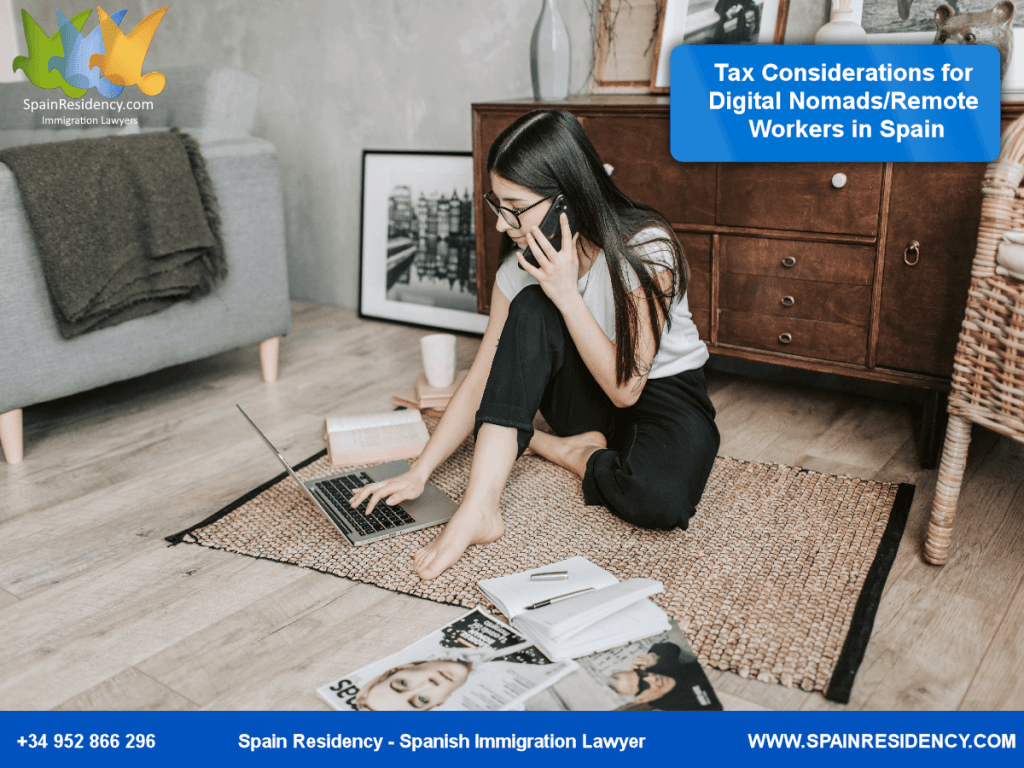The new digital nomad visa presents substantial benefits, with taxes being a standout feature. Holders of this permit can enjoy a special tax regime accompanied by ample deductions, subject to specific criteria. Our comprehensive article delves into the digital nomad visa tax, exploring taxation for online workers and resolving the common query of dual tax obligations. Let’s examine the exact tax rates, analyse the advantages, and address concerns regarding tax payments in Spain and the country of origin.
Read here the tax considerations for Digital-Nomads/Remote-Workers in Spain and understand if this route offers what you need.
Menu:
In this post we cover the following: (click any section to see its content)
Tax consideratrions for Digital-Nomads in Spain:
- DIGITAL NOMADS AND TAX LIABILITY IN SPAIN
- TAX OBLIGATIONS AS A TAX-RESIDENT IN SPAIN
- SPECIAL TAX REGIME FOR DIGITAL NOMADS
- TAX IMPLICATIONS OF THE SPAIN DIGITAL NOMAD VISA
- DUAL TAXATION NECESSITY AND REMEDIES
- WOULD YOU LIKE TO BE A DIGITAL NOMAD IN SPAIN?
DIGITAL NOMADS AND TAX LIABILITY IN SPAIN:
Residing in Spain for over 183 days within a calendar year designates one as a tax resident. Moreover, if your economic or professional centre of interest lies within Spanish territory, even with less than six months’ stay, tax residency is applicable. As a digital nomad visa holder, spending a minimum of 183 days annually becomes mandatory for residency renewal, rendering the acquisition of residency inevitable. While this bears significant implications, the new visa offers substantial advantages in this realm.
TAX OBLIGATIONS AS A TAX RESIDENT IN SPAIN:
As a tax resident, you are obligated to pay taxes in Spain akin to any other citizen. This includes income tax, where global income, earned both in Spain and elsewhere, becomes subject to taxation. Notably, as a remote-working digital nomad, this aspect carries great significance. The general rule dictates a progressive income tax rate dependent on earnings, reaching up to 50%, although certain regions in Spain offer lower rates. Thankfully, the digital nomad residency brings the advantage of a flat fee, significantly reducing tax burdens. To uncover further details, read on, as we explore these tax benefits in-depth and dispel the enigma of dual taxation (paying taxes abroad and in Spain).
SPECIAL TAX REGIME FOR DIGITAL NOMADS:
The advent of the startup law introduced substantial changes and advantages, most notably the opportunity to apply for a special tax regime as a remote worker. Upon obtaining a digital nomad visa and receiving a positive resolution, you become eligible to apply for the Beckham Law—an esteemed tax regime that grants non-resident status for tax purposes. Access a comprehensive guide on the Spanish Beckham Law for more information. This unique provision allows you to circumvent progressive income tax rates despite meeting the residency criteria by spending over 183 days in the country. Consequently, you avoid the burden of paying income tax at a progressive rate and relish reduced taxation. Additionally, this special tax regime exempts you from wealth tax and eliminates the requirement to file declarative model 720. It is crucial to note that meeting a crucial requirement is imperative to qualify for this favorable tax regime—you must not have been a resident of Spain for the past five years. This reduction in the previous ten-year requirement amplifies the benefits brought forth by the startup law.
TAX IMPLICATIONS OF THE SPAIN DIGITAL NOMAD VISA:
Digital nomad visa holders, classified as non-residents for tax purposes, encounter a fixed tax rate of 24% solely on the income generated within Spain (excluding worldwide income) up to 600,000€, mitigating the need to pay up to 50% in taxes. For income exceeding this threshold, the fixed tax rate increases to 47%. Moreover, capital gains are subject to specific tax rates, encompassing the sale of shares, properties, interests, and stocks. The tax rates applicable to digital nomads in such cases are as follows:
- 19% for amounts up to 6,000€
- 21% for amounts ranging from 6,001€ to 50,000€
- 23% for amounts ranging from 50,001€ to 200,000€
- 27% for amounts ranging from 200,001€ to 300,000€
- 28% for amounts exceeding 300,000€
While reduced taxation proves advantageous, the primary question persists, how does the tax situation unfold concerning taxes owed in the country of origin? Must digital nomads pay taxes in multiple countries?
DUAL TAXATION NECESSITY AND REMEDIES:
The pressing concern for many revolves around the prospect of paying taxes twice for the same income. Given the nature of a digital nomad, frequently transitioning between countries while working remotely, complications arise as different nations claim tax residency for these individuals under their respective tax regulations. In theory, this could result in the obligation to pay the same taxes twice. Similarly, consider the scenario of individuals employed by companies in their home countries but working from Spain—must they pay taxes in both their country of origin and in Spain?
The answer, as always, depends on various factors. It hinges on the laws of the individual’s country of origin and whether Spain has a double treaty convention with said country. These conventions establish clear guidelines to ascertain the exact tax residency of digital nomads, subsequently untangling the situation. Based on these conventions, dual taxation can be mitigated through two different methods: the exemption method and the tax credit method. It is imperative to seek guidance from a tax lawyer to comprehensively understand your unique circumstances and determine how and where to file your taxes.
ALL TYPES OF RESIDENCY AVAILABLE IN SPAIN:
- Golden-Visa Spain (Spain citizenship by investment)
- Non-Lucrative visa Spain (Spain visa non lucrative)
- Self-Employed visa Spain (self employed expats in Spain)
- Digital-Nomad visa Spain (remote worker in Spain)
Please see-here our video-blog with options and legal-advice to obtain residency in Spain.
Would you like to be a Digital-Nomad in Spain?
We will prepare with you the required documentation, complete the application forms, arrange the required appointments and legally advise.
Permanent residency is obtained after 5 years of Spanish Residency through Self-Employed Residency, Digital-Nomad, Non-Lucrative Residency or Golden-Visa. This followed by 5 years as a permanent resident in Spain and means you can then obtain Spanish Citizenship with a Spanish Passport.




